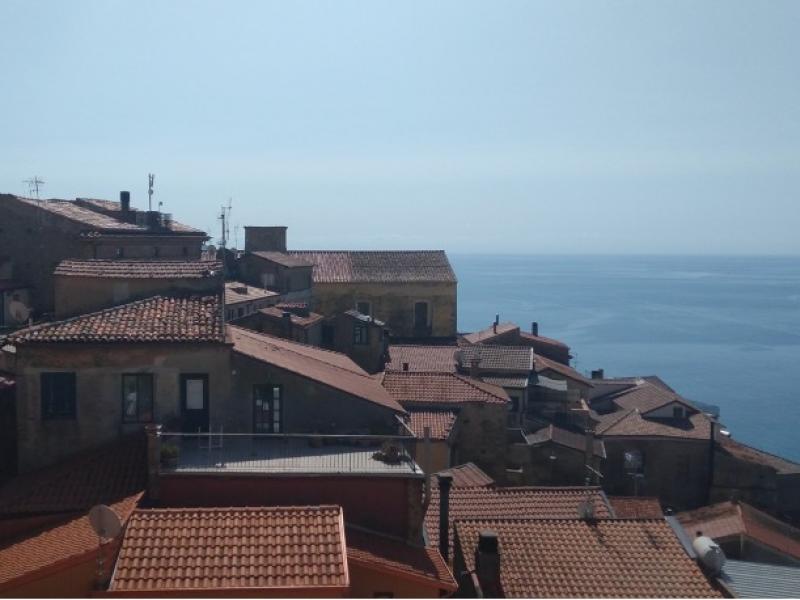Il territorio di Pisciotta è situato in un punto in cui montagna e mare si incontrano per formare un paesaggio di rarissima bellezza.
Il nome deriva da “ Pixoctum” , piccola Pixous ( la radice Pyx significa Bosso). Pixous era una città di origine greca che oggi è Policastro bussentino e che gli abitanti abbandonarono intorno al 915 per sfuggire agli attacchi saraceni e rifugiandosi su colline più difendibili. Il borgo sembra un vero e proprio presepe sulla cui parte alta spicca il Palazzo Marchesale da poco anche biblioteca pubblica. Altro punto d’interesse è la Chiesa madre e tutte le viuzze che scendono fino al mare e che la rendono così suggestiva . E’ la terra dell’olivo pisciottano , la specie più imponente d’Italia ma è soprattutto uno dei pochissimi borghi in cui si fa la pesca di “ Menaica”, un tipo di pesca antichissima che prende il nome dal tipo di rete che avendo buchi più grandi cattura fino a dissanguarle solo le alici più grandi( rispettando anche l’ecosistema), dandole un sapore particolare. Possono essere messe sotto sale o sott’olio e chiaramente ne viene da sé anche la raccolta e la vendita della colatura di alici . La marina con le sue acque cristalline si può raggiungere sia a piedi ( per i più atletici) che con l’auto .
The territory of Pisciotta Is located at a point where the montains and the sea meet to form a landscape of very rare beauty.
The name cames from “Pixoctum” , small “Pixous” , a city of greek origin that today Is Policastro Bussentino that the inhabitants abandoned around 915 to escape Saracens attacks and take refuge on more defensible hills. The village looks like a real nativity scene on the upper part of which the marquis palace, recently also a public library, stands out. Another point of interest is the mother Church and all the alleys that go down to the sea that make it so suggestive. It’s the land of the “ Pisciottano olive tree” , the most Impressive species in Italy but above all one of the very few edges where “ menaica fishing” is done, a very ancient type of fishing that takes its name from the type of net that, having larger holes, catches up to bleed only the largest anchovies while ( respecting the ecosystem) also giving it a particular flavor. They can be salted or on oil , obviously the collection and sale of anchovies sauce also come from that.
The Marina with its crystal clear waters can be reached either on foot ( for the more athletics) or by car.
This excursion can also be made in reverse , coming from the sea.
Le territoire de Pisciotta est situé à un point où les montagnes et la mer se rencontrent pour former un paysage d’une beauté très rare.
Le nom derive de “Pixoctum” , le petit Pixous. Pixous était une ville d' origine grecque qu aujourd’hui est Policastro Bussentino et que les habitants abandonnèrent vers 915 pour échapper aux attaques Sarrasins et se réfugier sur des collines plus defendibles. Le village ressemble à un véritable crèche sur la partie haute de laquelle se détache le Palais du marchis , recennement bibliothèque aussi. Un autre point d’interet est l’eglise mère et toutes les ruelles qui descendent vers la mer et qui la rendent si suggestive. C’est le pays de l’Olivier Pisciottano , l’espece la plus impressionnante d' Italie mais surtout l’un des très rares villages où se pratique la pêche à la “Menaica” , un type de pêche très ancien qui tire son nom de son filet qui ayant des trous p!us grands jusqu’à ce que seuls les plus gros anchois soient saigner( tout en respectant l écosystème) en leur donnant une saveur particulière.
Ils peuvent être salés ou à l’huile et de là vient aussi la collecte et la vente de sauces aux anchois.
La Marine , avec ses eaux cristallines, est accessible soit à pied ( pour les plus sportifs !) Soit en voiture.
L’excursion peut aussi se faire à l’envers en venant de la mer.
El territorio de Pisciotta se encuentra en un punto donde las montañas y el mar se encuentran para formar un paisaje de rara belleza.
El nombre proviene de “Pixoctum”, pequeña “Pixous” . Pixous era una ciudad de origen griega que hoy es Policastro Bussentino y que los habitantes abandonaron alrededor del 915 para escapar de los ataques sarracenos y refugiarse en cerros más defendibles. El pueblo parece un auténtico Belén en cuya parte superior destaca el palacio del marqués, recientemente biblioteca pública también.
Otro punto de interés es la Iglesia madre y todos los callejones que bajan al mar y que la hacen tan sugerente.
Es la tierra del Olivo Pisciottano, la especie más impresionante de Italia pero sobre todo es uno de los poquísimos pueblos donde se practica la pesca de “Menaica” , un tipo de pesca muy antiguo que toma su nombre del tipo de red que , al tener agujeros más grandes ,atrapa hasta desangrar solo las anchoas mayores ( respectando al mismo tiempo el ecosistema) dándole un sabor particular. Pueden ser saladas o en aceite y claramente de las mismas viene la recolección y venta de salsa de anchoas.
El puerto deportivo con sus aguas cristalinas se puede llegar a pie ( para los más deportistas) o en el coche.
Esta excursión se puede hacer al revés también, llegando desde el mar.

